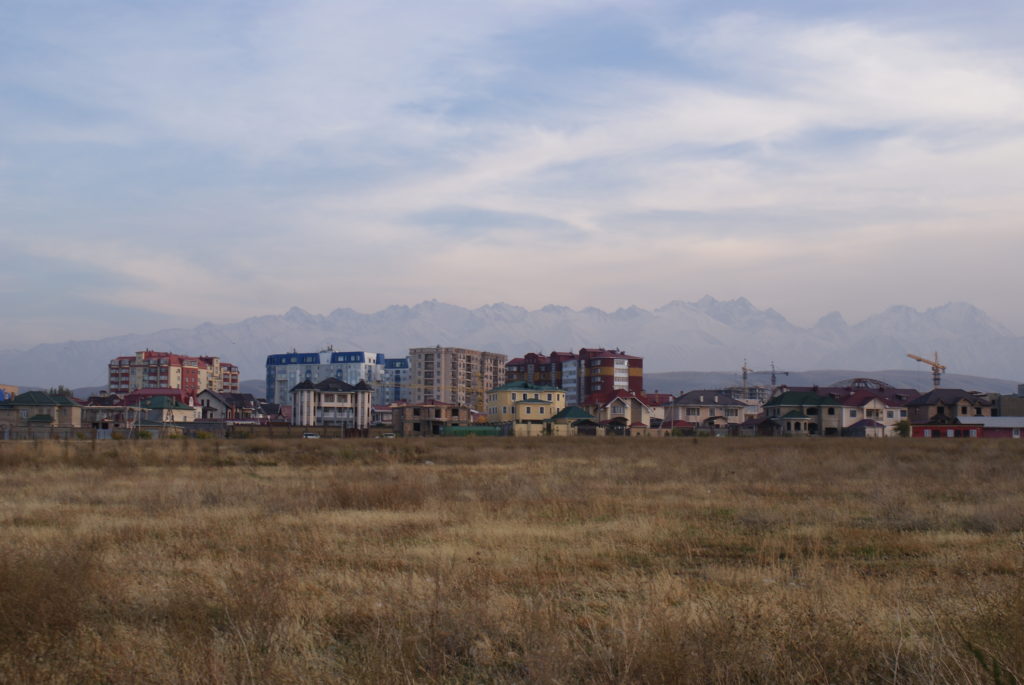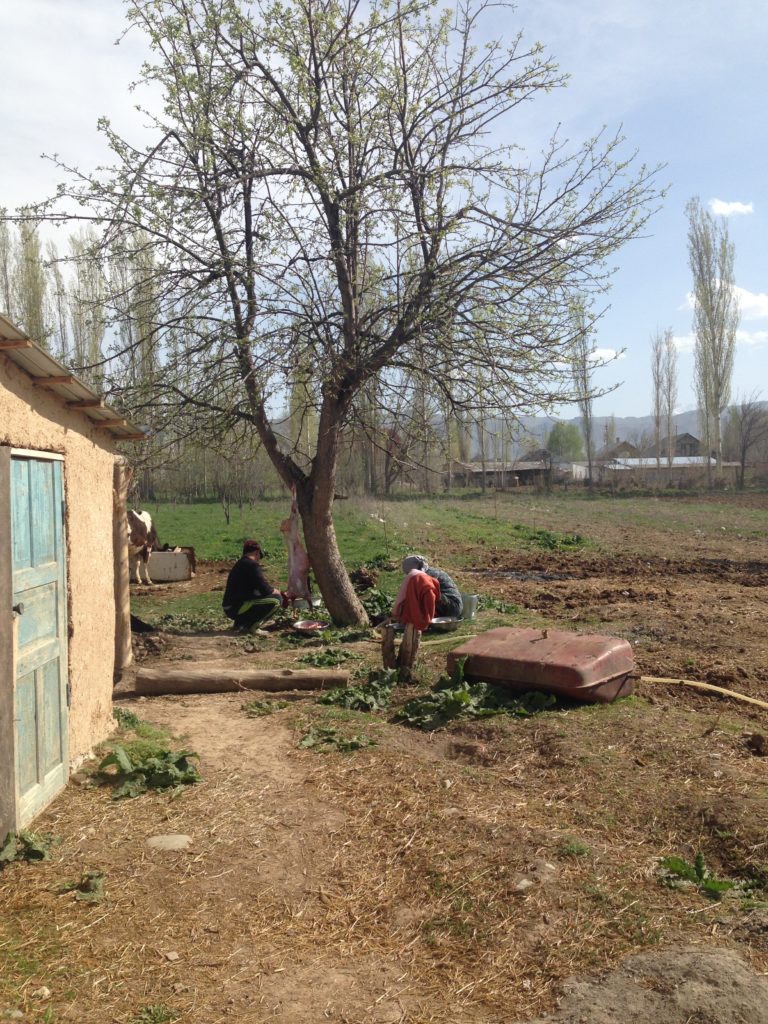
New construction on the southwestern edge of Bishkek, Kyrgyzstan. Photograph by author.
This essay was first made available last month, exclusively for our Interviewer and above level Patreon supporters. If you want to support Full Stop’s original literary criticism, please consider becoming a Patreon supporter.
In late fall in Bishkek, the capital of the former Soviet republic Kyrgyzstan, the city was so dark that heading home in the evening I imagined the electric trolleybuses were submarines, carrying the sooty-snow smell of Christmastime.
Trolleybus 5 dropped me off at Jal, the concrete housing complex on the southwestern edge of the city, where I rented a room in a first-floor apartment. Jal was the last Soviet housing development, or mikrorayon, built in the city, which means that its plat is larger than the city’s others, its buildings taller. With the painted building numbers chipping off and the streetlights long dysfunctional, it was nearly impossible to navigate; only lighted apartment windows guided me home, across earthquake-cracked asphalt capped by black ice.
Our neighbors took pride in how unchanged the neighborhood was since the Soviet era: being far from the city center had insulated Jal from some of the upheavals of capitalism and commercialization. Yet change had nevertheless crept in. The wooden seats belonging to the benches and swings of the courtyard playgrounds were all rotted or stolen, my landlady lamented; the state preschools on the buildings’ garden levels had been replaced by private notaries and drugstores. At the edges of the decaying neighborhood, the newly wealthy were building large single-family homes surrounded by walls, and the Turkish government was constructing a new university and a large mosque.
I had come to the country on a Fulbright research fellowship spanning the 2014-2015 academic year. Central Asia had fascinated me since the age of eight, when my next-door neighbors decamped for Kazakhstan to work for an oil company; when I finally visited, I was enchanted by its vast expanses, which reminded me of my native Colorado, but less crowded by highways and second homes and chairlifts. Having proposed to spend the year studying pastoralists’ environmental ethics, I dreamed of spending the year traveling between yurts on horseback and herding sheep to alpine meadows, as though I were going to find some kind of alternate, purer outcome for the landscape from which I came.
Instead, both in Bishkek and in the village where I went to conduct fieldwork, I found myself constantly assigned to the kitchen, a supposedly naturally shared sphere, where I was to keep other women company and help with what I could. I had none of the requisite skills. I was raised by a single mother who didn’t cook; we ate Burger King, Pillsbury croissants, turkey sandwiches. When I moved into my own apartment at twenty, working a student job at a sustainable agriculture nonprofit and filled with ambitions of cooking healthy food, I lost fifteen pounds in two months. I finally learned to feed myself, but the ingredients I’d learned to make simple food out of—quinoa, kale—don’t circulate in Kyrgyzstan. Useless in the kitchen, I felt as though a rigid conception of womanhood, something I believed myself to have overcome, was being forced on me. Because no one had ever asked me to be one, it turned out, I didn’t know how to see women, to see the work they did, the interior lives they stoked concurrently with their household duties. I was so green in my own womanhood as to see the women around me as obstructions and inferiors.
Only slowly did I recognize that life in the kitchen was not keeping me from my work, from “real life,” nor from being the person I imagined myself to be. As the women around me welcomed me into the kitchen’s intimacy, my cohabitants fine-tuned my knowledge of Russian and Kyrgyz, and of the intricacies of code-switching between them. They trained me in the embodied practices of culture: the right way to pour tea, to roll out dough. They shared their thoughts on socialism, capitalism, democracy, and inequality; they told me their life histories. Participating in their world and coming to appreciate the depth of their lives, I began to relate to other women newly: attentively, reciprocally. I learned to see those around me—in Kyrgyzstan and back home in the United States—not as pawns or blind followers but as fellow travelers, comrades, for whom womanhood was as ambivalent and confusing to grow into as it was for me. In turn I learned to see womanhood not as something that I had triumphantly avoided, but as an experience at once particular and shared, piecemeal and totalizing; as a process of gaining wisdom through trials and their transmission through anecdotes, quiet, in fleeting shared spaces: above all, in the kitchen.
I’ll tell you about three kitchens in Kyrgyzstan, a quarter-century post-Soviet.
*
In Jal, I lived in building 72 with my landlady, a 56-year-old widow named Chachikey, and Nazik, another renter who was my age. Our small entryway was a jumble of slippers and winter boots; our wool coats hung from a peg rack, layered thick on top of one another.
We all got home around seven each day. Nazik and I usually made it back first. The first thing each of us did was to change into our house clothes—leggings and ratty sweaters, tank tops and sweatpants, no bras. When Chachikey arrived, wearing the ornamented, dark blue uniform of her work selling train tickets, she would call out, “Mamochka prishla!”—Your mama has arrived!—when she heard Nazik and me giggling in the kitchen. If our conversation was too risqué, Nazik would hush me and shut the kitchen door. But eventually we all ended up in the kitchen together, microwaving leftovers or cooking pasta and potatoes, drinking down the teapot again and again.
Both Nazik and Chachikey were ethnically Kyrgyz, but together we spoke Russian. Chachikey had grown up during the Soviet Union, with its centralized, high-quality education, and attended an athletic boarding school where she had track practice three times a day. Nazik was born, like me, as the USSR was falling apart. Her mother was still in college then, and her father died when she was a baby, so she spent the first years of her life with her grandparents. Her mom, a Russian teacher in a Kyrgyz-language school, knew the Russian-language schools were better, and wanted her daughter to attend one. “My mom came to get me when I was three and pretended she didn’t know Kyrgyz,” Nazik said.
When the teapot was empty, we each dumped out the pile of loose leaves that had accumulated at the bottom of our glass cups. After a few minutes, Nazik, taking on the role traditionally occupied by a daughter-in-law for our haphazard family, poured us each a quarter-cup of steeped tea from the porcelain pot on the table, then filled the rest of the cups with boiled water from the kettle on the stove. Eventually she trusted me to pour the tea, but for the first few months, any time I tried to refill my own, she blocked my reach. “Eto slozhno.” It’s complicated.
Nazik and I talked late into the night. She complained that her friends didn’t care about anything besides looking good on social media and getting married; she wanted to talk about faith and poetry. Over the course of the year, she stopped wearing long sleeves and a hijab to go out. We talked through the decision over tea and stale pastries.
“I used to think I needed to demonstrate that I was pious, like a sacrifice,” she said. “Now I think love for God is in the heart.”
During the hot spring, she bought a pair of shorts. “I want to dress more like you,” she said, “Amerikanskii.” I suddenly questioned my comportment, the ways in which my rejection of what I had thought was womanhood was tied up with notions of progress and development, with American exceptionalism. Liberation and imperialism suddenly faced each other, the line between them blurry.
Most pressing on Nazik’s mind was the expectation to marry and have children. At twenty-five, her family was telling her she was already late. Instead of marriage, she was going through a protracted breakup with a fiancé in Kazakhstan and hoping to emigrate, to anywhere. She said that what she would miss most about the relationship was his mother, who was liberal, and spurned the materialism of other Kazakh women.
“They live in a well-off city where most women buy new furniture every six months. But she doesn’t see the point,” she said. Lowering her voice: “And she let us sleep in the same bed when I visited!”
At the time, I was three years into a relationship with a man I had met in college, certain in my love to the point of smugness. I advised her to follow through with the breakup, that she would get over the relationship with his mother. But years later, when I finally broke off my relationship, it was the relationship with my partner’s mother that I mourned: its absence blindsided me, a loss I hadn’t chosen. I wanted to go back and indulge Nazik’s hesitation, knowing the tragic way that relationships between women disappear when their male conditions of possibility fall apart.
Nazik was not the only woman who told me repeatedly and frankly that she did not want to get married so young, yet must have known herself to be on the precipice of compliance. The rights of women have backslid in Kyrgyzstan since the Soviet era, as a fixed notion of tradition—as something upheld by women, while men work to advance the country—has become integral to ethnicity-based nation building. “Bride kidnapping” has been rediscovered as a fundament of “Kyrgyzness.” One of my tutors told me that when she went to the village where she grew up, there were places she simply didn’t go, knowing the threat of being stolen. A law allowing kidnapping victims to return home gave rise to an epidemic of suicides by women who knew they faced a compromised future as “damaged goods.” Imitating Russia, the government has cracked down on humanitarian NGOs, and condoned violence against LGBT people. Misinformation about women’s health is rampant. Multiple acquaintances warned me, heeding advice from their doctors, that birth control and abortion cause infertility. Whole sections of the Kyrgyz public sphere are closed to women, and those that are open feel crowded with rules for comportment.
Perhaps the most egregiously repressive sphere of women’s life in post-socialist Kyrgyzstan—for the degree to which it is normalized—is the treatment of kelins, or daughters-in-law, who are frequently regarded as servants to their husband’s parents. It seemed that every woman to whom I talked about the kelin role abhorred and feared it.
“I had a single mother,” Nazik said. “We could eat whatever we wanted, whenever we wanted. We could sleep whenever we wanted. We lived for ourselves. How could I possibly do the kelin thing!?”
We shared this in common. Yet she could already see the ways in which her upbringing was different than others’, the ways that being an outsider to traditional structures came with benefits, and the ways it had made her into a different kind of adult woman. I associated my childhood with sadness and alienation. I was determined to do everything to avoid it for myself, determined to be married before thirty and to stay so. Only four years later, ending my seven-year relationship with my college boyfriend, did I see how the ways I chafed at so much within the household I shared with him, my claustrophobia and yelling, yelling that felt like it came from some other uncontrollable set of lungs floating behind me or to the side, were related to feeling encroached upon by gender roles I had started performing unthinkingly, without seeing their outline being drawn around me, subtly shaped by a partner whose childhood, not by the fault of anyone, had conditioned more traditional expectations in him.
Nazik laughed, and, as always, bit her tongue between her teeth. Sitting opposite her so many hours, I started doing this too—I still do it. As the anthropologist Jeanne Favret-Saada writes: “When two people are affected, things pass between them that are inaccessible to the ethnographer.”
A year and a half after I left Kyrgyzstan, Nazik told me over WhatsApp that she was pregnant, by her old fiancé. She married him several months later. Several days after the wedding, she posted a photograph on Instagram in which she was dressed in the outfit of the kelin—a hospital-colored housedress and white kerchief—with the caption: “It was never my image of myself, but all the same I came out a pretty good kelin.”
My initial reaction was to see it as degrading. But the underlying cheekiness indicated that Nazik knew something that it was taking me much longer to figure out, some infinitely durable thread of knowledge circulated in kitchens, and there only: one can perform roles without becoming them, can maintain one’s interiority beneath duty and compliance. Months later, she posted a photograph of herself pushing a stroller in a park. “I’m the mother of a daughter,” she wrote, “striving to be a good example.” She meant it, I knew, in ways that far exceeded the expectations of the kelin’s role—she was setting an example for being thoughtful, curious, romantic, radiant.
Teresa de Laurentis writes that “gender has the function of constituting concrete individuals as men and women,” while Judith Butler describes gender as “an imitation with no original.” At first, in the kitchen, I only let myself see a caricature original of Kyrgyz womanhood; I missed the individuals. Yet I learned from Nazik, who learned faster than I did, that becoming a woman is an unending process of negotiating one’s relationship to that absent original. Womanhood is not being a woman but being caught somewhere between oneself and an abstract, imagined figure.
*
When spring came, I left the city for three months to conduct research in a village in the sunny plains province in the northwest corner of the country, near the Kazakh border. Like so many others, the village was platted during the period of Soviet sedentarization, and consisted of three long streets anchored by a collective farm, now long ransacked for saleable metal and useful cinderblocks. I lived with a mother and three children. With the rural economy dismantled, men across the country had left for Russia, including the patriarch of their family, who sent remittances from a job as an undocumented taxi driver. We socialized with everyone on our street and no one beyond it. I was told not to go for walks, because people would see me and gossip.

Backyard sheep butchering in Talas Province, Kyrgyzstan. Photograph by author.
The village kitchen was again the marketplace of news, opinions, reflections. It was larger than the apartment kitchen, and had a wooden floor painted light blue, on which once a week the women of the block would gather in a circle to roll out dough under wooden broomhandles, our dresses pushed back, leggings revealed, the experienced women making fun of my thick, lumpy dough, while the neighbors’ girl baby Altynai held herself up against the wall babbling, and eight-year-old Acema and ten-year-old Aijan, sisters, sat at the table eating last week’s stale bread with jam and yogurt.
The women repeated the saws about how early marriage and children following soon after was compulsory (and I should get to it, with a Kyrgyz man); fertility paramount, because Kyrgzystan is a small country; sex before marriage and divorce forbidden. But it was also where they revealed the transgressions. One evening, drinking tea with a cousin of a friend, she introduced me to another woman, a sister, who lived with her and her husband.
“She never got married,” she said.
“I never wanted to,” the woman added. She was tall and reserved, and reminded me of single rural women I know in the United States, people quietly living out alternative lives, people on whom families and communities depend without noticing they have made space for them.
“She makes handicrafts instead,” the first woman said. Together they began to point to rugs she had felted, seat cushions she had embroidered. “You can tell people back in America, there is a woman in Kyrgyzstan who never married, who lives up in the mountains and makes these beautiful things.”
Another acquaintance married six months pregnant, and told me that at her wedding, half her female in-laws told her, “I was that big when I got married, too.”
“I thought I had broken the rules,” she said.
And on the other side of the street lived the baby Altynai, with three other children, a mother and father, and two grandparents. The grandparents took care of the baby, though it visibly exhausted them. They started asking me to watch her in the afternoons. I brought her to have tea with an old woman across the street one day.
“Do you have divorce in your country?” she asked me abruptly. I remember, because it was disturbing and yet normal, that there was a Ukrainian film depicting women being trafficked for prostitution playing on the small TV set up next to the table where we were sharing crackers and jam.
“Yes,” I said. “My parents are divorced. Do you have it here?”
The woman rolled her eyes toward the baby, as though I should have already figured it out.
When I brought Altynai back to her grandparents’ kitchen that afternoon, they laughed at the way the baby nuzzled my breast.
“She already thinks you’re her mother!” they said.
“Where is her mother?” I asked tentatively. They explained that her mother was in Russia, also trying to send remittances, but she had gotten pregnant, by a Russian, after already having been divorced once.
Having no other choice, I gave into the routines of womanhood. I learned that I loved holding the baby’s hand up to touch the nose of the foal kept in a corral in our backyard, watching how she recoiled and giggled at its wetness and warmth. When I took her out in the stroller, mothers and grandparents taking their own babies for walks greeted me. They asked how many months she was, and told me how old theirs were.
“Kachan barat? Bilbeibiz!” One grandfather said to me, pointing to his grandson in his stroller. When will he walk? We don’t know!
Back at home, Indira tried to get Altynai to walk too. She propped her standing, back to the wall, and crouched on the floor several feet away, clapping and encouraging, “kel! kel!” Come! Come! Altynai shrieked, then finally let herself tumble forward.
I started to see the point of—and the pleasure in—the duties of care that come with womanhood, unchosen. I became attached to spending time with people of all stages of life. It was inoculation against the sterile control over one’s life that one can imagine when surrounded by healthy, productive young people. Yet when I retreated to my desk every afternoon to write, I also recognized it as a pleasure contingent upon remaining alongside, rather than within, women’s and family life, while still being welcome there: as another type of woman in the world, like the handicraft-maker—a participant on one’s own terms, protective of her interiority, who doesn’t desire all the trappings for herself.
*
Back in the capital, I accompanied a friend to a feminist organization’s weekly vegan dinner, held in a small white house tucked down an alley off of one of the city’s main boulevards. The group had been forced to hide their address because of repeated violence by nationalists against their mostly queer membership. A monitor in the room adjacent to the kitchen displayed a live feed from a security camera.
The kitchen was similar to the one where I spent my evenings gossiping and philosophizing with Nazik: the furniture and appliances were of the same Soviet vintage, it was equally cramped and cozy, and there was a similar sense of camaraderie.
It was also completely different. Everyone there was braless too, but with flannel shirts and asymmetrical haircuts. There was a poster on the wall that said, “Women—your place is in this house,” with an image of the Kyrgyz house of parliament. Graphics were stenciled on the walls with spray paint, Foucault on the bookshelf. The feminists were mostly ethnic Russians; many of them had studied at the English-language American University of Central Asia. There was just one ethnic Kyrgyz woman, a single mother whose toddler was watching cartoons in the other room.
The dinner’s discussion, in “clean” Russian (without Kyrgyz interspersed), surprised me in its academicism. But despite the elevated vocabulary, not only were the kitchens similar, so were the critiques of Kyrgyz gender roles leveled within them. Where Nazik, Chachikey, and the women of the village dressed up in their roles, and saved their complaints for the privacy of the kitchen, the feminists strived to live out an alternative vision, neither more nor less valid, for womanhood and community. Yet its fullest expression was, too, hidden in the kitchen.
*
When dinner was over, we put on our wool coats, most of the women called cars from the “safe” cab company—every member of the LGBT community I met in Kyrgyzstan had suffered assault, and taxis were a specific source of fear—and I headed home by bus.
Back in Jal, Nazik and Chachikey were up late in their leggings and sweaters. They asked where I had been.
“I had dinner with some feminists,” I said.
“What is a feminist?” Chachikey asked.
“It’s someone who supports the rights of women,” I said.
“Do they exist everywhere? Or only in Bishkek?”
“All over the world,” I said.
“Well, we are all women!” Chachikey said. “I support the rights of women.” She looked at Nazik, who nodded. “We are a feminist house!” said Chachikey.
The next morning, Chachikey was rolling out bread dough on the small table in the kitchen. Every time she rolled it out, there was a small tear in the flattened dough. She balled it up and tried again, over and over. The tear kept appearing.
She took off her wedding ring and held it up to me.
“Do you know how to say this in Kyrgyz?” she asked, in Russian.
“Shakek,” I said. She nodded.
“It’s in the way.” She set it next to the sink, and rolled out the dough once more, flat, no tears.
Caroline Tracey grew up in Colorado and is a PhD candidate in Geography at the University of California, Berkeley. Her nonfiction has appeared in the Nation, the Guardian, SFMOMA’s Open Space, New South, and elsewhere.
This post may contain affiliate links.







